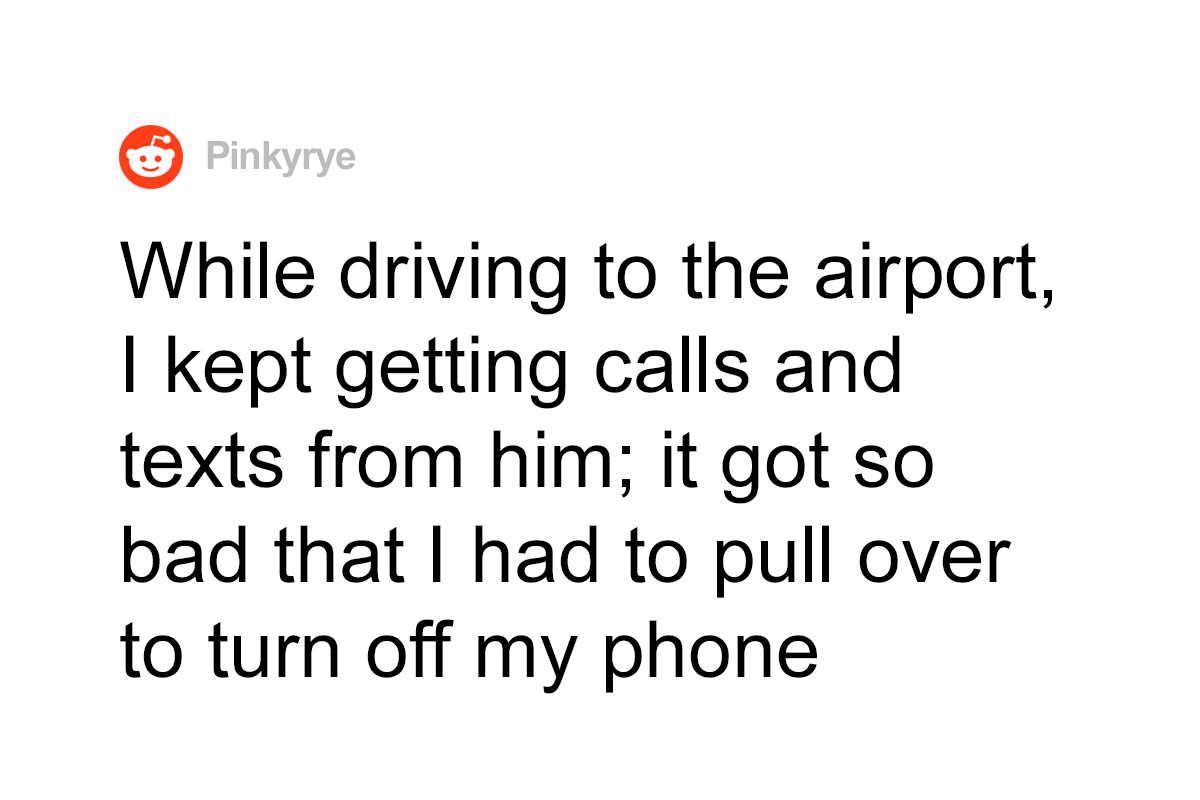
New Boss Is Mad At This Woman Because She Didn’t Want To Cover A Shift And Went On Vacation
This is a story about a boss who thinks he completely owns his employees. Even their free time.
Submitted to the popular ‘Am I The [Jerk]?‘ subreddit by one of his employees, a woman known online as Pinkyrye, it describes a particularly infuriating time when he demanded she postpone a pre-planned date with her long-distance boyfriend.
The boss wanted her to cover a shift and used every trick in the book to convince her. But Pinkyrye didn’t succumb to the psychological blackmail and walked out of the workplace. However, he wasn’t done yet.
When this boss asked his employee to postpone her vacation and cover for a coworker, he refused to take no for an answer
Image credits: RODNAE Productions (not the actual photo)
And started attacking her with an endless barrage of calls and texts
Image credits: Daria Nepriakhina 🇺🇦 (not the actual photo)
According to Andrew Pullman, the Managing Director of HR consultancy People Risk Solutions, the test for working out whether or not a company is asking too much of their employees during their vacation all comes down to common sense.
“As long as an employer behaves reasonably, the reasonable requests should be responded to,” Pullman told MailOnline Travel.
The degree of said reasonableness usually depends on what type of job the person in question does and what level of responsibility they have at the company.
“If you’re a senior manager, you might choose to go away and not be bothered, but if you are a key part of the business and something comes up and you don’t respond, the company could be regarded as having reasonably acted where you did not,” Pullman said.
“Whereas, if you are more junior and less critical to the operation and want to go on holiday, then get bombarded, it depends on what it is about and if it is necessary to have your input.”
“Obviously, the idea that you are away … means you should have a holiday and most companies do adhere to that, but there should be a reasonable expectation that someone might get in contact.”
While employees shouldn’t be expected to work when they go on vacation, Pullman believes that there are plenty of situations that would call for a person to put in some hours during their break.
The trick is working out how badly your assistance is needed, or if someone else could do the task just as well.
In Pinkyrye’s case, her boss definitely could’ve waited for her to come back to work to have the talk he wanted. Even if she responded to the calls and texts, it wouldn’t have made any difference. Maybe ruining her time off was his goal?
After her story went viral, the woman made an update
“Question if you are the only person available,” Pullman said. “If they have an issue back at the office where someone is under a bus and another is in an uncontactable situation, then it is only fair and sensible to help.”
“And it also depends on what the requests are – if they are normal day-to-day things that aren’t vital, you are within your rights to say ‘I’ll deal with it when I get back.'”
But in the extreme situation where a person is asked to return from holiday to work early, Pullman believes that there are very few valid reasons.
“It would have to be a fairly critical situation where a large chunk of business might be lost, the business is in trouble or absolutely no one else can deal with it.”
“And that person would have to be recompensed in some way, providing them with another holiday at the least.”
However, if an employer randomly summons people back, that, at least in the HR consultant’s eyes, suggests they might not be someone you want to work for.
And provided more context
Image credits: Pinkyrye
Interestingly, a YouGov research found that the majority (60%) of those who use email for work check their inbox while on holiday. One in four (25%) do it “very often,” while one in five (19%) check “sometimes” and one in six (16%) check “rarely.”
Four in ten (40%) say they never look at their emails when they’re away.
This is despite the fact that eight in ten workers (80%) would prefer to “completely switch off” when they’re on holiday, rather than stay on top of what’s going on in the office.
(The exception is those who check their emails “very often.” Half of this group (47%), in fact, would rather stay on top of what’s going on at work, with the other half (50%) are happy to stay out of work issues while on vacation.)
You might assume that bosses like Pinkyrye’s, piling on the pressure, is the main reason why so many workers want to stay in the loop. But it’s not.
Among workers with a manager, just one in twenty (5%) think their boss would “definitely” expect them to check their emails, while only one in ten (10%) said they “probably” would.
By comparison, over eight in ten (82%) believe their managers either probably or definitely would not expect them to be in touch.
Here’s the discussion that followed
Hah, I'd like to see them try this where I work (in a European country). Every working day at 4pm, I log off and am not available until 7.30am the next day. No emails, no calls during the weekend. And definitely not during my holiday!! It is completely insane that someone would be written off for starting their holiday as it was approved. I have been working for about 20 years, and never has my holiday been cancelled or someone tried to bother me during it.
Haha yeah the country I live in something like this would just not happen. I have legal right to a minimum of 4 consecutive weeks summer vacation, if I would be ordered in after the vacation is approved they have to pay me anywhere from double to triple salary so that would never happen
Load More Replies...A fantastic and insanely over-worked colleague of mine finally got allowed to take time off for a holiday. This sounds like a lie but I promise you it is not- she was standing with her husband at the top of a ski slope in France about to go down and one of our supervisors started calling her to ask if she was available to come in and cover for somebody. She let it go through to voicemail luckily. This was when we were so short-staffed my partner and I were working 65h+ weeks, which in the health and social care sector is very dangerous for everyone involved. Sure we have strict employment laws in the UK but by no means does that guarantee your employer is going to abide by them or even respect them.
Highly inappropriate and illegal. Well maybe not in Canada. But I took holidays after nearly three years no break, it was only five days. I was in airport boarding flight when I got a call from my GM. I returned after five days of holidays, walked in at 7am, at 7.05 I handed in my two weeks notice and left, because I had over two weeks of unused.holidays and contract/law says I must use them or company must pay out. Two years later in a new job, I finished 1am at 9am manager starts texting me, +20text in less than five minutes. I attached notice and company owner, his wife and son, other managers to email. I even left a remark at the bottom of the notice of anyone calls me, or speaks to me, stops me on the street I will single out everyone through harassment reports and to contact solicitor, well manager didn't believe and stopped me on street, I reported her and company paid out six months wages+salary+holidays. Employment laws are important! If Im not scheduled then it's not my pro
Oh it's very illegal in Canada. There are a few avenues she could pursue.
Load More Replies...Hah, I'd like to see them try this where I work (in a European country). Every working day at 4pm, I log off and am not available until 7.30am the next day. No emails, no calls during the weekend. And definitely not during my holiday!! It is completely insane that someone would be written off for starting their holiday as it was approved. I have been working for about 20 years, and never has my holiday been cancelled or someone tried to bother me during it.
Haha yeah the country I live in something like this would just not happen. I have legal right to a minimum of 4 consecutive weeks summer vacation, if I would be ordered in after the vacation is approved they have to pay me anywhere from double to triple salary so that would never happen
Load More Replies...A fantastic and insanely over-worked colleague of mine finally got allowed to take time off for a holiday. This sounds like a lie but I promise you it is not- she was standing with her husband at the top of a ski slope in France about to go down and one of our supervisors started calling her to ask if she was available to come in and cover for somebody. She let it go through to voicemail luckily. This was when we were so short-staffed my partner and I were working 65h+ weeks, which in the health and social care sector is very dangerous for everyone involved. Sure we have strict employment laws in the UK but by no means does that guarantee your employer is going to abide by them or even respect them.
Highly inappropriate and illegal. Well maybe not in Canada. But I took holidays after nearly three years no break, it was only five days. I was in airport boarding flight when I got a call from my GM. I returned after five days of holidays, walked in at 7am, at 7.05 I handed in my two weeks notice and left, because I had over two weeks of unused.holidays and contract/law says I must use them or company must pay out. Two years later in a new job, I finished 1am at 9am manager starts texting me, +20text in less than five minutes. I attached notice and company owner, his wife and son, other managers to email. I even left a remark at the bottom of the notice of anyone calls me, or speaks to me, stops me on the street I will single out everyone through harassment reports and to contact solicitor, well manager didn't believe and stopped me on street, I reported her and company paid out six months wages+salary+holidays. Employment laws are important! If Im not scheduled then it's not my pro
Oh it's very illegal in Canada. There are a few avenues she could pursue.
Load More Replies...
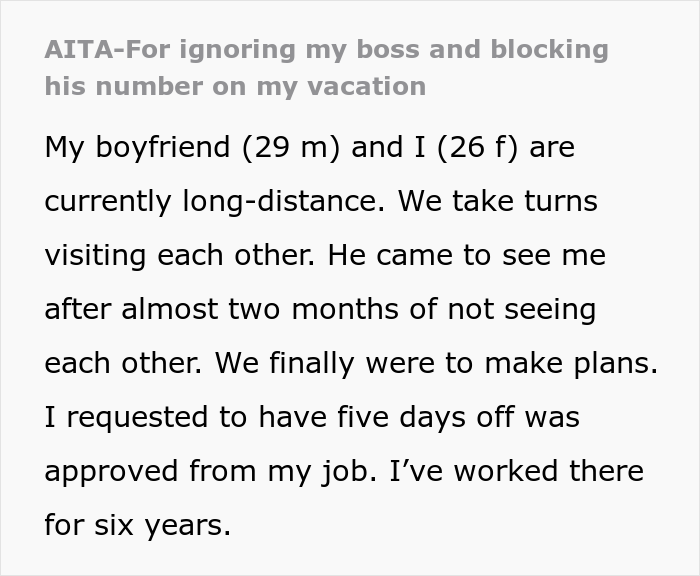
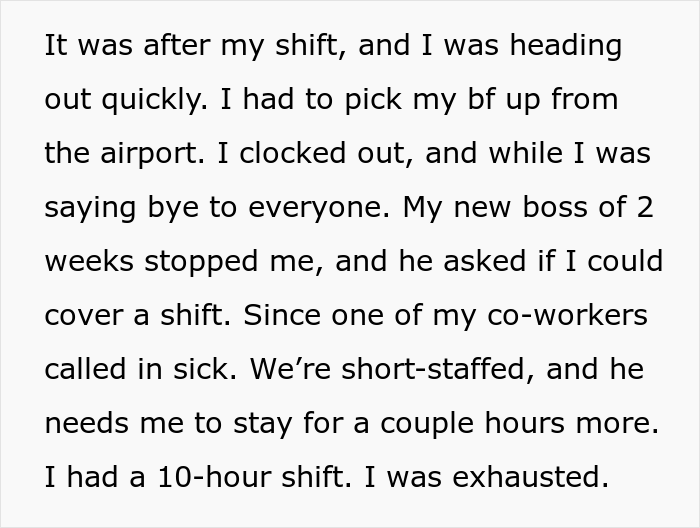
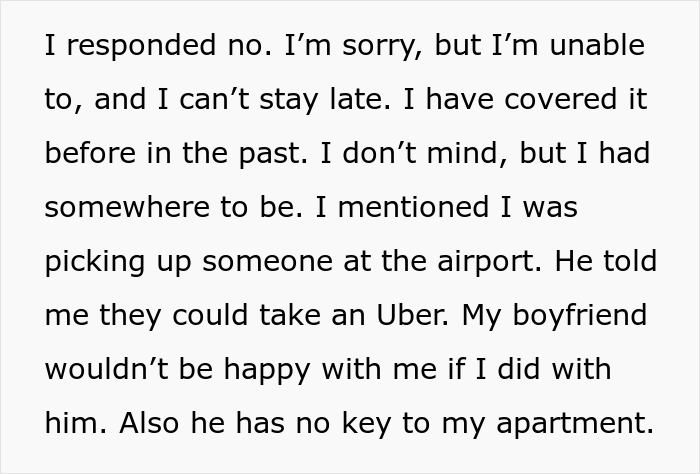
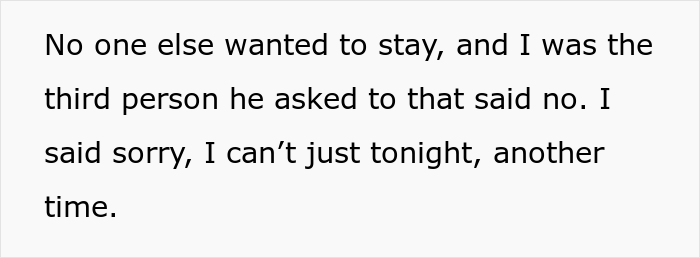
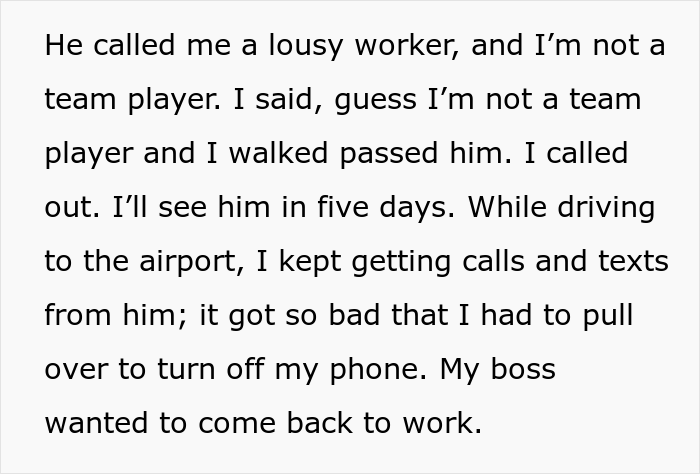


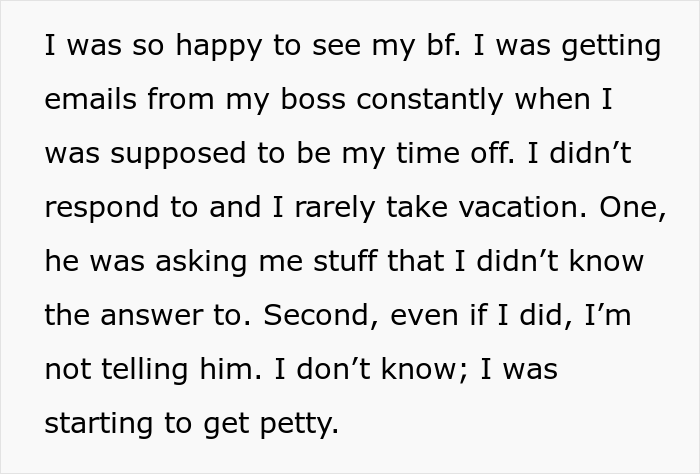
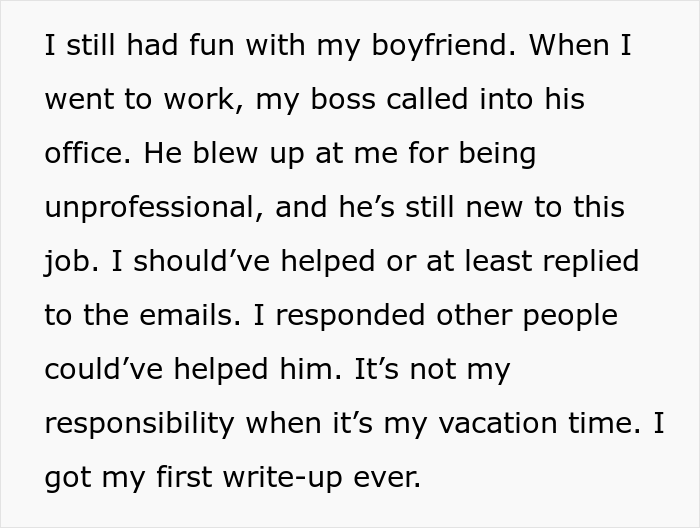

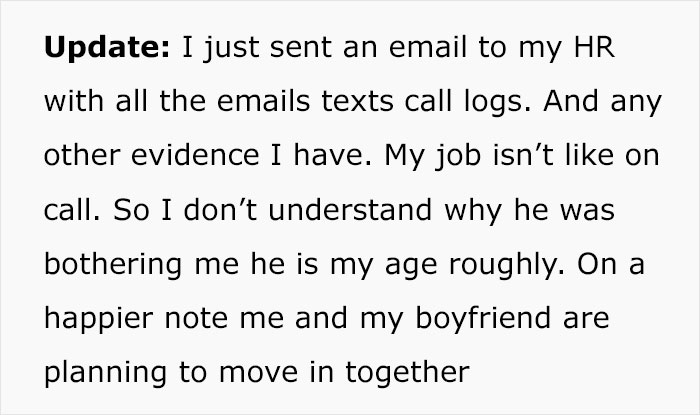
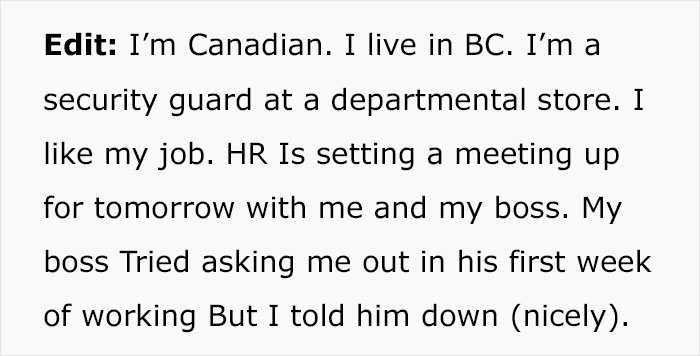
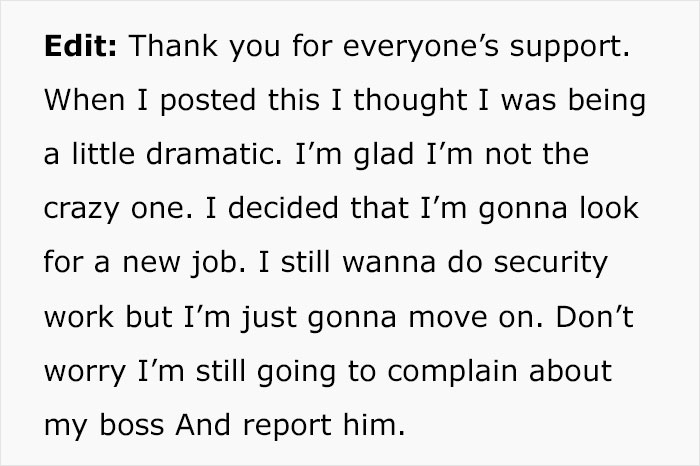
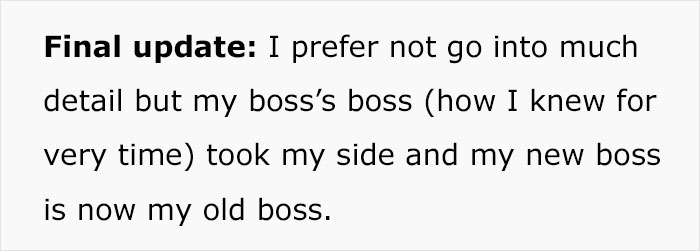
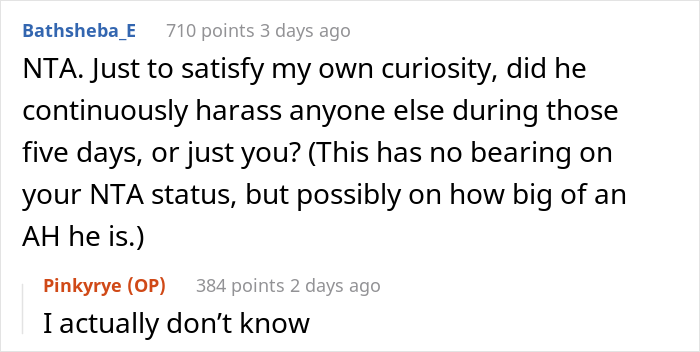
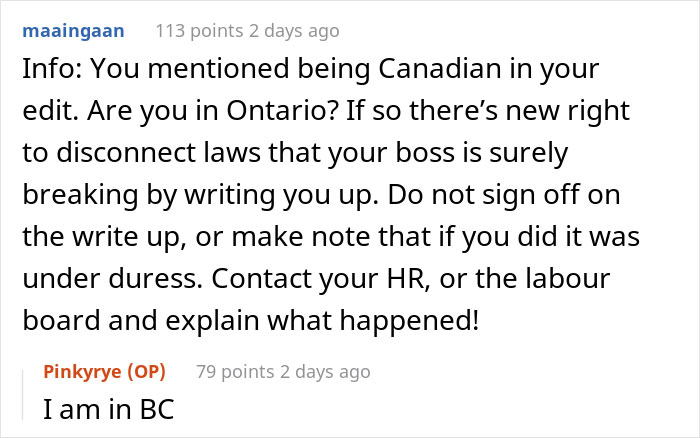
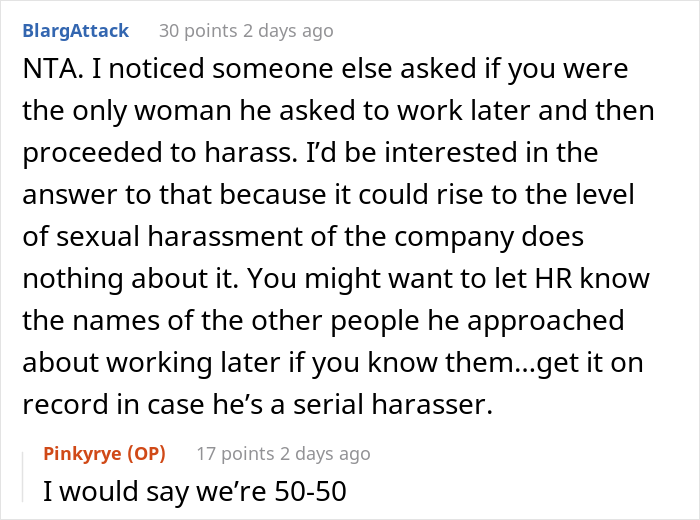
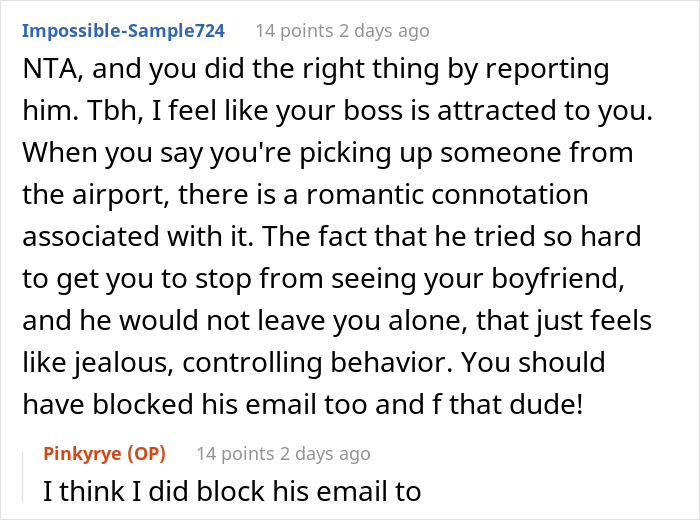

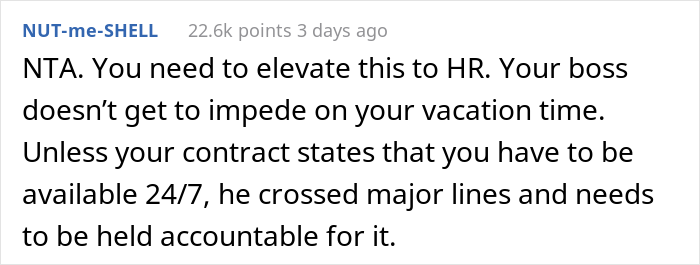

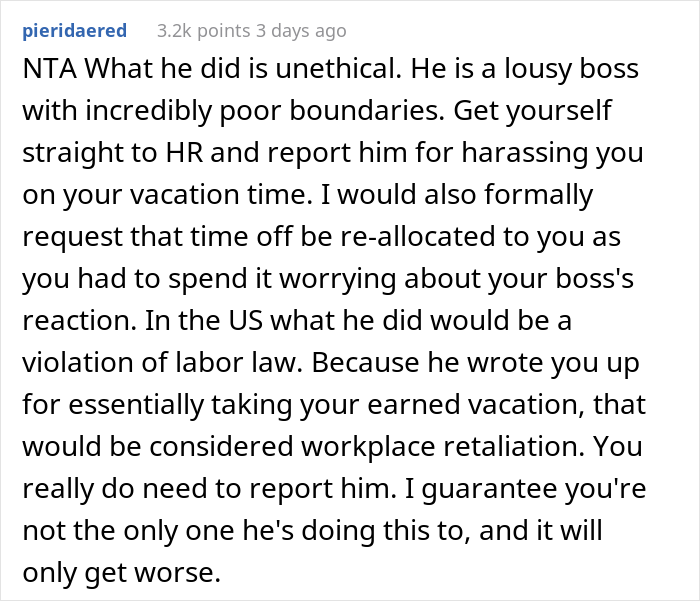
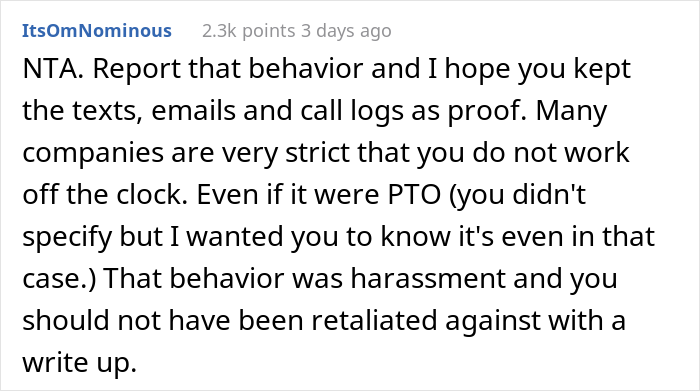


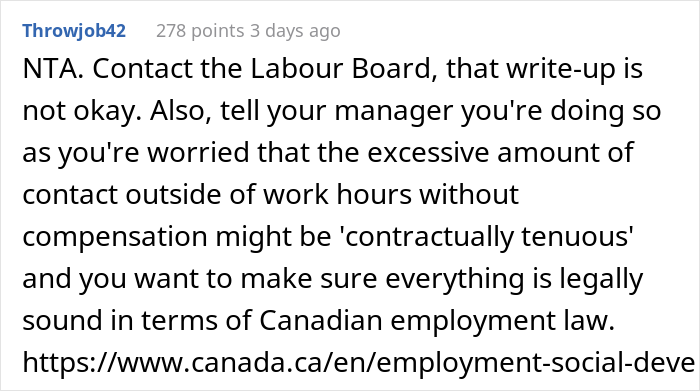
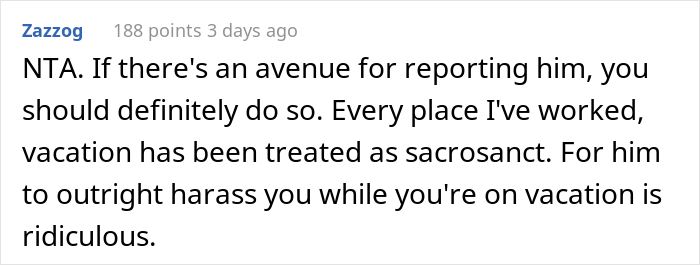
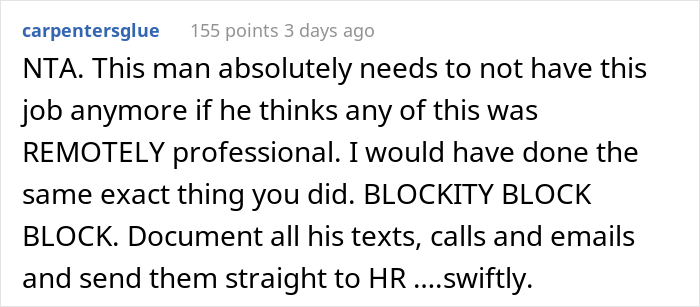
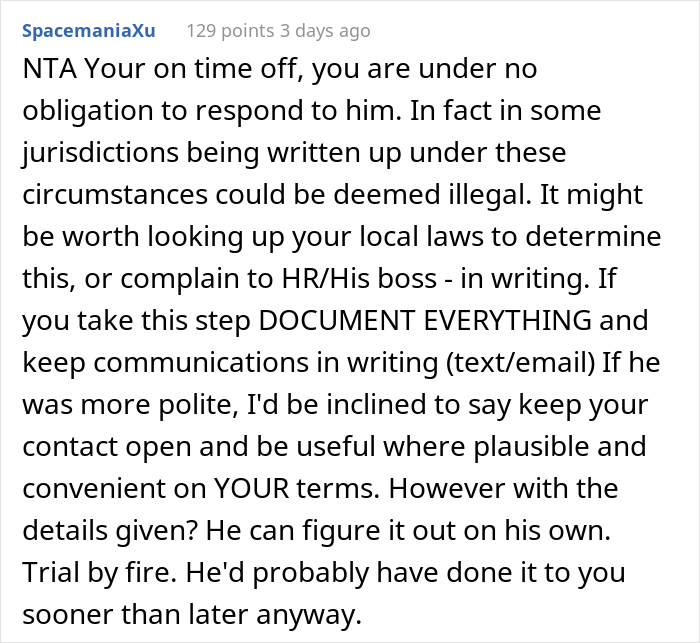






83
21